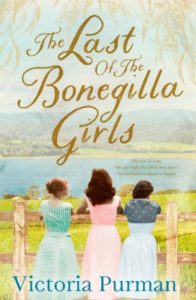 Welcome to Teaser Tuesday, the series where I share snippets from new and past releases and works-in-progress, and occasionally twist the arms of author friends to do the same.
Welcome to Teaser Tuesday, the series where I share snippets from new and past releases and works-in-progress, and occasionally twist the arms of author friends to do the same.
Ooh, I love having guests on Teaser Tuesday. It’s a nice break from featuring my own work and guests always share really cool excerpts.
Today is no exception on the cool excerpt front, or the cool author for that matter because, my lovelies, we’re hosting Victoria Purman. Rah!
Now Victoria has been a guest previously on Teaser Tuesday, promoting her sexy firefighter novella Flame, from the Firefighters of Montana Series. Of course, you’d be more familiar with Victoria from her coastal romances such as Nobody Like Him, Someone Like You, Our Kind of Love, and the family saga The Three Miss Allens.
Clever Victoria has taken another creative turn with her latest release, and you are going to be as fascinated as I am by this one. Here’s Victoria to tell you the story behind The Last of the Bonegilla Girls and share an excerpt.
Make sure you read to the end because there could be a GIVEAWAY!
 In 1954, my grandparents Stefan and Maria Scheirich arrived in Australia with five children, two suitcases, a wooden trunk, and memories of their birthplace devastated by the war.
In 1954, my grandparents Stefan and Maria Scheirich arrived in Australia with five children, two suitcases, a wooden trunk, and memories of their birthplace devastated by the war.
Inside that trunk were some photos and papers, their best clothes, a new set of saucepans that my Oma had bought in Germany and hadn’t wanted to leave behind, and some new Christmas candles. When they put them up on their first Australian Christmas tree, the candles wilted in the 40 degree heat and the whole family cried with homesickness.
They’d lived in Germany as refugees since the end of the war – they were Hungarian-born but of German heritage – and had decided to cross the seas to create new lives for themselves and their children.
They disembarked the Fairsea on June 12, stepped on to a train and then got off at Bonegilla, near Albury Wodonga on the New South Wales Victoria border. It was June and freezing cold and they lived there with thousands of other “new Australians” while waiting to be assigned work anywhere in this wide brown land.
My Oma and Opa and their children were among the three hundred thousands people who passed through the Bonegilla Migrant Reception Centre while it was operating between 1947 and 1971.
More than one in twenty Australians have a link to someone who passed through Bonegilla. As I’ve grown older, I’ve asked myself how much I really know about my parents’ and our grandparents’ stories. And that question was the inspiration behind “The Last of the Bonegilla Girls”.
Sixteen year old Elizabeta Schmidt blinked open her sleepy eyes. The camp. The word had been whispered from one family to another on the rust red train, in whatever common language people had. Like a Chinese whisper, the words spread from carriage to carriage, seat after seat, over hats and scarved heads and little children’s curls. In hushed and tired voices, like a wave, it meant that there journey was almost over.
It had been six weeks since the Schmidt family had left Bremerhaven to begin their journey on the Fairsea through the North Sea, around Europe to Malta, then Port Said in Egypt, and to Melbourne via Perth. After a rough voyage over the Great Australian Bight, during which her mother was sick every day, they’d berthed at Port Melbourne and then crossed a wharf and climbed aboard the train with many carriages. It was almost midnight and Elizabeta was tired and scared. The leather seats were a small comfort. She and her family had been forced on to all kinds of trains before with nothing so luxurious; they had had no windows and only wooden planks to sit on. Elizabeta didn’t mind this Australian train at all.
 She pulled her brand new woollen winter coat tighter around her and lifted the collar to cover her ears. Not everyone seemed so happy to be going to the place called Bonegilla. The sobbing from behind her had begun an hour before and the woman hadn’t stopped. Elizabeta didn’t recognise the words, but thought it might be Russian perhaps, or Ukrainian. Elizabeta had been surrounded by languages her whole life. She spoke Hungarian and German, and had picked up some English in the classes provided on the Fairsea on the voyage over and from lessons from her father. She recognised the harshness of Polish with all its zeds and jheds. The passionate roar of Italian and the sounds of Greek, in which everything seemed to end in ki. People had picked up languages like scraps of food, anything to help survive the war. In her world for the past ten years, everyone had been seeking refuge from somewhere.
She pulled her brand new woollen winter coat tighter around her and lifted the collar to cover her ears. Not everyone seemed so happy to be going to the place called Bonegilla. The sobbing from behind her had begun an hour before and the woman hadn’t stopped. Elizabeta didn’t recognise the words, but thought it might be Russian perhaps, or Ukrainian. Elizabeta had been surrounded by languages her whole life. She spoke Hungarian and German, and had picked up some English in the classes provided on the Fairsea on the voyage over and from lessons from her father. She recognised the harshness of Polish with all its zeds and jheds. The passionate roar of Italian and the sounds of Greek, in which everything seemed to end in ki. People had picked up languages like scraps of food, anything to help survive the war. In her world for the past ten years, everyone had been seeking refuge from somewhere.
The train slowed and lurched and then pulled up with a brake squeal of fingernails on a blackboard and the woman behind Elizabeta began howling even louder.
Someone whispered in German, ‘Sie war in den Lagern. Sie mag es nicht, Züge. Sie verstehen.’
She was in the camps. She doesn’t like trains. You understand.
There were murmurs and nods of agreement all around.
The rattle of the train stilled and Elizabeta stared out the window into the black nothingness. There wasn’t a star in the sky. Dim lights brightened a platform, but there were no buildings to be seen. There was a strange whistling in the dark, a rustle of leaves perhaps in the distance. The sobbing woman howled again, which set off a couple of tired children who began to squawk. Slowly, everyone around her stood, collected their belongings and bags, reached for the hands of children, and moved down the carriage towards the open doors. Elizabeta stayed close to her parents, Jozef and Berta, and when her mother asked her to make sure she held her little sister’s hand, Elizabeta clasped Luisa’s fingers in hers. Her nine year old sister looked up at her with tired eyes.
‘Wir sind hier, Luisa,’ she said.
How wonderful does this sound? Brilliant, I reckon and perfect for Mother’s Day. If you’re hungry for more, which I bet you are, you can read an even meatier, 5 chapter excerpt here.
Better still, purchase The Last of the Bonegilla Girls in paperback or ebook today from your favourite book retailer or try these online stores:
Booktopia | Angus and Robertson Bookworld | Dymocks
Amazon.com | Amazon.com.au | iBooks | Kobo | Google Play
Now, as mentioned in the intro, Victoria has generously offered you lucky lovelies a …
GIVEAWAY!
The Last of the Bonegilla Girls is described as a post-Second World War story of strong female ties and family, secrets and lies, set in the multicultural Australia of the fifties.
So let’s talk multi-culturalism. What’s your favourite aspect of Australia’s multicultural society?
I want to say something noble about people and culture but I’m going to be selfish and nominate the food instead. I adore how we can eat the world in Australia, without stepping a toe out of the country.
Share your thoughts and you’ll be entered into the draw to win a signed paperback of The Last of the Bonegilla Girls.
Please note: Giveaway closes midnight Friday, Australian Eastern Time, 27th April 2018. Australian postal addresses only.
If you’d like to learn more about Victoria and her wonderful books, please visit her website. You can also connect on Facebook and Twitter via @VictoriaPurman.


Comments are closed